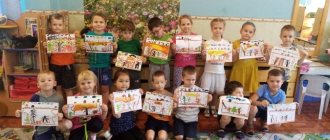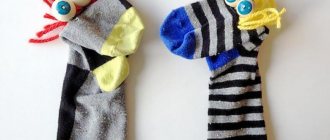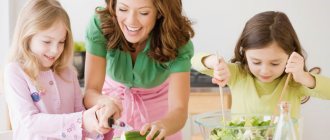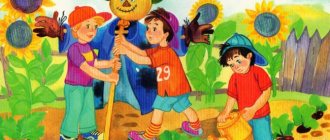ALGORITHMS OF SELF-CARE SKILLS BY GROUPS
Guidelines
The formation of self-service labor skills is closely interconnected with the formation of cultural and hygienic skills and affects their improvement. The algorithm will help the teacher in working on a long-term plan, in thinking through the sequence and choosing specific forms and methods of work for a more complete and timely formation of all self-service labor skills in children of each age group.
ON A NOTE. Didactic games for kindergarten at low prices from a specialized store for teachers “Kindergarten” - detsad-shop.ru
HOUSEHOLD WORK: Tasks and content of work in groups
1st junior group
1. Teach children to maintain order in the playroom and, at the end of the games, to place the play material in its place.
2. Involve children in performing simple labor activities. Together with an adult and under his supervision, place bread bins (without bread) and napkin holders on the table before eating.
2nd junior group
1. Encourage children to independently carry out basic tasks - prepare materials for classes (brushes, modeling boards, etc.); After playing, put away toys and building materials
2. Teach to maintain order and cleanliness in the premises and area of the kindergarten
3. Encourage to provide assistance to adults, to cultivate a caring attitude towards the results of their work.
4. In the second half of the year, begin to develop in children the skills necessary for serving in the dining room: helping to set the table for dinner (laying out spoons and forks, arranging bread bins, plates, cups, etc.).
Middle group
1. Teach children to maintain order in the group and in the kindergarten area: put away building materials, help the teacher, glue books and boxes.
2. Teach children to independently perform the duties of a canteen attendant: carefully arrange bread bins, lay out cutlery (spoons, forks, knives).
Senior group
1. Teach children to help adults maintain order in the group: wipe toys and teaching aids, wash toys and building materials, repair books and toys.
2. To develop the ability to clean up the kindergarten area: sweep and clear paths of debris, snow in winter, water sand in the sandbox
3. Teach children to independently and conscientiously perform the duties of the dining room attendants, to set the table, to clear away the dishes after meals.
4. Learn to independently lay out materials for classes prepared by the teacher, put them away, wash brushes, paint sockets, palettes, wipe tables
Preparatory group
1. Continue to teach children to constantly and promptly maintain order in the group and on the site: wipe toys and aids, wash toys, building materials, repair books and toys together with the teacher.
2. Continue to teach how to independently clean up the kindergarten area: sweep and clear paths of debris, snow in winter, water sand in the sandbox.
3. Learn to make your own bed after sleep
4. Accustom children to independently and conscientiously perform the duties of dining room attendants: setting the table in full, distributing second and third (berries, fruits) courses, clearing away dishes after meals, sweeping the floor
5. Learn to independently lay out materials for classes prepared by the teacher, put them away, wash brushes, paint sockets, and wipe tables.
By the end of the year, children can: organize their workspace and put it in order after classes are over.
Guidelines
The work of developing household skills in children is interconnected with the formation of the child’s general culture: setting the table correctly, cleaning the table, maintaining cleanliness and order in the room and area. Mastering labor and household operations makes a child independent and ready for adult life.
ON A NOTE. Role-playing costumes for kindergarten at low prices from the specialized store for teachers “Kindergarten” - detsad-shop.ru
ALGORITHMS FOR FAMILIARIZING CHILDREN WITH HOUSEHOLD WORK BY GROUPS
Literature
- Voronkevich O. A. Welcome to ecology. - SPb.: CHILDREN'S PRESS, 2006.
- Golitsina N. S. Organization and conduct of thematic control in preschool educational institutions. - M.: Scriptorium, 2004.
- Golitsina N. S. Organization and content of the work of a senior preschool teacher. - M.: Scriptorium, 2008.
- Kozlova S. A., Kulikova T. A. Preschool pedagogy. - M.: Academy, 2002.
- Methodological recommendations for the program of education and training in kindergarten / Ed. M. A. Vasilyeva, V. V. Gerbova, T. S. Komarova. - M.: Publishing house "Education of preschoolers", 2008.
- Prikhodko E. G., Malyshevich T. V. A new model of educational activities of a teacher in a preschool educational institution. - Krasnodar: World of Kuban, 2006.
Material provided by the magazine PRESCHOOL PEDAGOGY, November 2010




